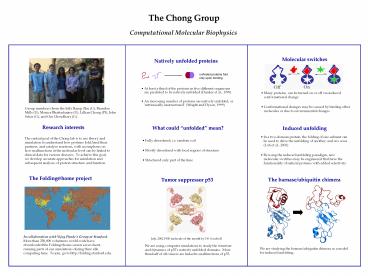The Chong Group - PowerPoint PPT Presentation
Title:
The Chong Group
Description:
The Chong Group Computational Molecular Biophysics unfolded proteins fold only upon binding Molecular switches Natively unfolded proteins At least a third of the ... – PowerPoint PPT presentation
Number of Views:39
Avg rating:3.0/5.0
Title: The Chong Group
1
The Chong Group
Computational Molecular Biophysics
Molecular switches
Natively unfolded proteins
- At least a third of the proteins in five
different organisms are predicted to be natively
unfolded (Dunker et al., 1999) - An increasing number of proteins are natively
unfolded, or intrinsically unstructured
(Wright and Dyson, 1999)
- Many proteins can be turned on or off via
induced conformational change - Conformational changes may be caused by binding
other molecules or due to environmental changes
Group members (from the left) Ranqi Zhu (G),
Brandon Mills (U), Monica Bhattacharjee (U),
Lillian Chong (PI), John Sekar (G), and Om
Choudhary (G).
Research interests
What could unfolded mean?
Induced unfolding
- In a two-domain protein, the folding of one
subunit can be used to drive the unfolding of
another, and vice versa (Loh et al., 2003) - By using the induced unfolding paradigm, new
molecular switches may be engineered that have
the functionality of natural proteins with added
selectivity
The central goal of the Chong lab is to use
theory and simulation to understand how proteins
fold, bind their partners, and catalyze
reactions, with an emphasis on how malfunctions
at the molecular level can be linked to clinical
data for various diseases. To achieve this goal,
we develop accurate approaches for simulation and
subsequent analysis of protein structure and
function.
- Fully disordered, i.e. random coil
- Mostly disordered with local regions of structure
- Structured only part of the time
The Folding_at_home project
The barnase/ubiquitin chimera
Tumor suppressor p53
In collaboration with Vijay Pandes Group at
Stanford More than 250,000 volunteers
world-wide have downloaded the Folding_at_home
screen saver client, running parts of our
simulations during their idle computing time. To
join, go to http//folding.stanford.edu.
July, 2002 PDB molecule of the month by DS
Goodsell
We are using computer simulations to study the
structure and dynamics of p53s natively unfolded
domains. More than half of all cancers are
linked to malfunctions of p53.
We are studying the barnase/ubiquitin chimera as
a model for induced unfolding.































